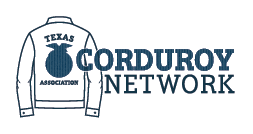|
|
Overview
Students use the scientific process as they reinforce skills and principles they have learned in agriscience courses. They conduct research projects and prepare a scientific report and display for judging at the state level.
State winners in each category in divisions 3-6 are awarded $1,000 scholarship. State winners in each category in divisions 1-2 are awarded $250 scholarship. All state winners will advance to the National FFA Summer Judging Process and are eligible to compete at the National FFA Agriscience Fair held in conjunction with National FFA Convention.
All state winners will need to visit the Texas FFA Foundation webpage and follow the steps on how to claim an award scholarship. http://mytexasffa.org/foundation/claim-award
|
2026 Agriscience Fair Rule Revisions September 15, 2025
The following changes to the Agriscience Fair Rulebook were approved by the Texas FFA Board of Directors during the first quarter board meeting held on September 15, 2025. Please reference the revised Agriscience Fair Handbook in the document section.
Rules revised and/or editted inlcude: 4, 5, 6, 7, 8, 9, 10, 11, 12, and 14.
|
Competition Categories
Students can compete in the Agriscience Fair as an individual or with a team.
- Division 1 – individual member in grades 7 and 8
- Division 2 – team of two members in grades 7 and 8
- Division 3 – individual member in grades 9 and 10
- Division 4 – team of two members in grades 9 and 10
- Division 5 – individual member in grades 11 and 12
- Division 6 – team of two members in grades 11 and 12
Animal Systems (AS):
The study of animal systems, including life processes, health, nutrition, genetics, management and processing, through the study of small animals, aquaculture, livestock, dairy, horses and/or poultry.
Environmental Services/Natural Resource Systems (ENR):
The study of systems, instruments and technology used in waste management; the study of the management of soil, water, wildlife, forests and air as natural resources and their influence on the environment.
Food Products and Processing Systems (FPP):
The study of product development, quality assurance, food safety, production, sales and service, regulation and compliance and food service within the food science industry.
Plant Systems (PS):
The study of plant life cycles, classifications, functions, structures, reproduction, media and nutrients, as well as growth and cultural practices, through the study of crops, turf grass, trees and shrubs and/or ornamental plants.
Power, Structural and Technical Systems (PST):
The study of agricultural equipment, power systems, alternative fuel sources and precision technology, as well as woodworking, metalworking, welding and project planning for agricultural structures.
Social Science (SS):
The study of human behavior and the interaction of individuals in and to society, including agricultural education, agribusiness economic, agricultural communication, agricultural leadership and other social science applications in agriculture, food and natural resources.
|
|
|
|
|
|
|
|
|
|
|
|
2025 Agriscience Fair Rankings
|
|
|
|
|
|
|
|
|
|
|
Agriscience Fair Resources
|
|
|
|
|
|
|
|
|
|
|
|
Texas FFA Agriscience Fair Application Submission Deadline is May 20, 2026 at 11:59 p.m.
Applications will be scored and ranked during the 2026 State Degree Check in Stephenville, Texas, June 1 - 5, 2026.
Gold rated applications will advance to participate in the the Texas FFA Agrisicence Fair Contest at the 2026 Texas FFA Convention.
For information contact:
Michael Rainey
michaelraineyffa@gmail.com
Tammy Glascock
tammy@texasffa.org
The 2026 Agriscience Fair dates are June 1 - 5, 2026 for application scoring and ranking only.
Gold rated applications will advance to the Texas FFA State Convention.
Submission deadline for Agriscience Fair applications through AET is May 20, 2026 by 11:59 p.m.
Entry fees for Gold Rated applications will be assessed to each chapter's convention registration fee through the Texas FFA Roster Management System based on the number of Agriscience Fair applications submitted through AET.
Entry fee is $60 per application submitted.
Schedule/Dates:
May 20, 2026: Submission deadline by 11:59 p.m. through AET.
June 1-5, 2026: Application Review and Ranking
TBD: Interviews/Presentations of Gold Ranked Applications
|
|
|
| |
|
|
|
|
|
|
|
|
|
Teachers will approve and submit applictions, reseach papers and other related documents through www.theaet.com.
Deadline for submission through AET:
May 20, 2026 at 11:59 p.m.
A $60 entry fee for those applications advancing to the interview round of the competition will be added to each chapters Texas FFA Convention invoice the week following the Texas FFA State Degree Check.
|
|
|
| |
|
|
|
|
|
|
|
|
|

The goal of the Corduroy Network is to provide teachers and contest facilitators with a list of qualified judges for various FFA events.
View the Corduroy Network here!
|
|
|
| |
|
|
|
|
|
|
|
|
Agriscience Fair Committee
|
|
|
|
|
|
|
|
|